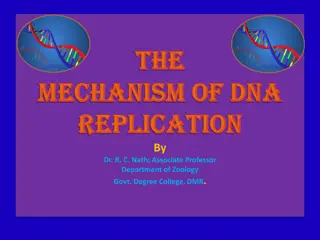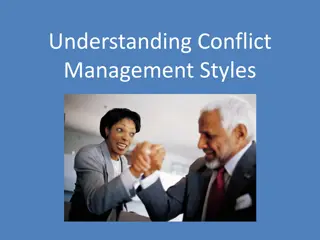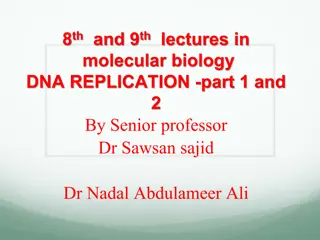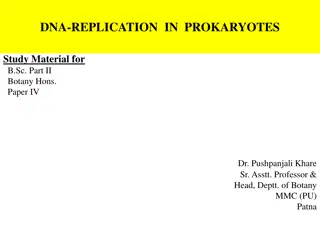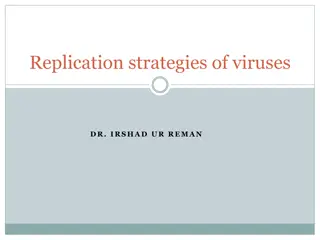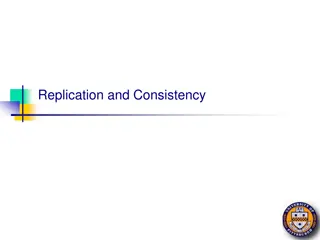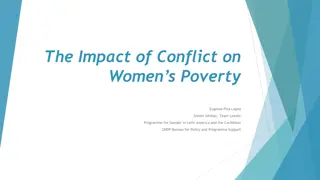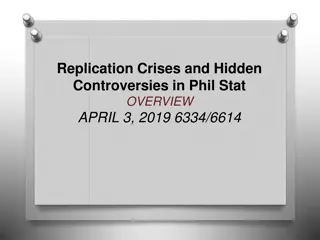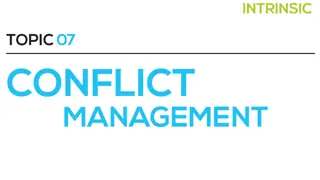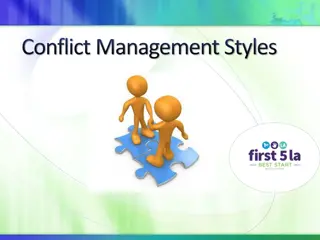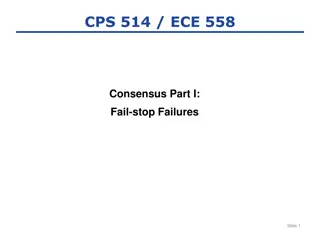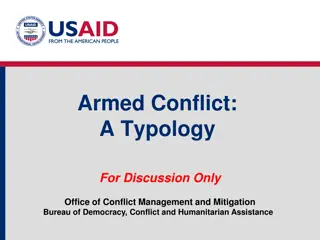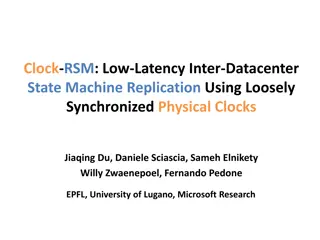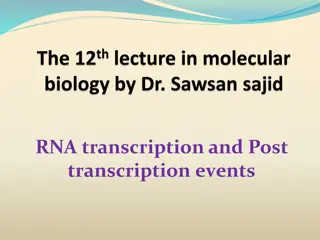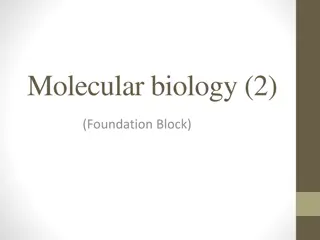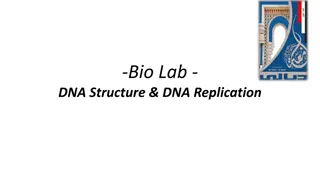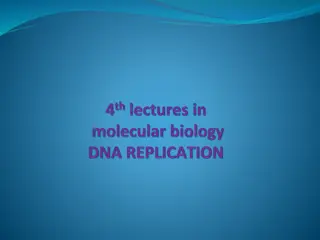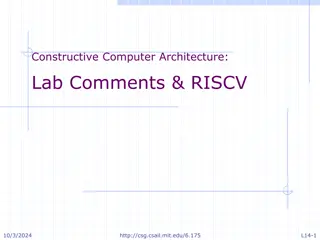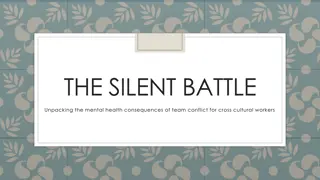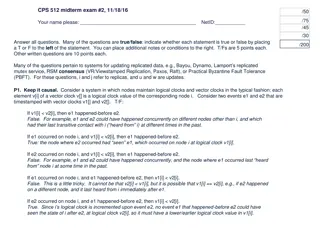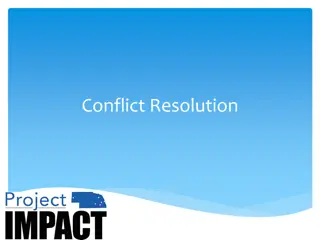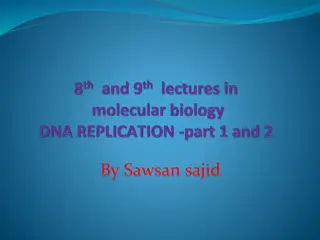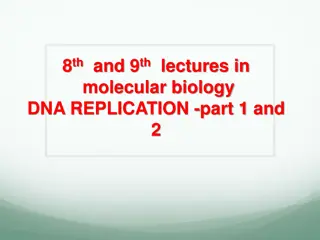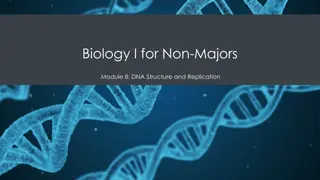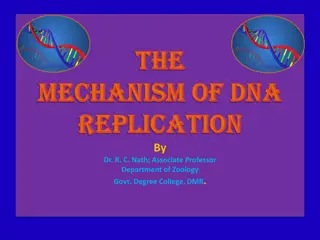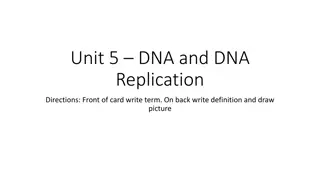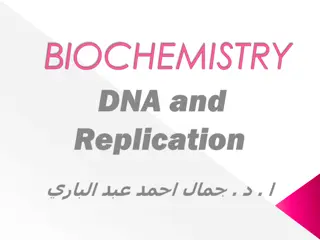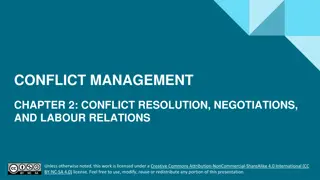Data Director Replication Best Practices
Explore best practices in data replication using methods like SQL, Web Services, and SaaS architecture. Learn about distribution, security, and central versions. Gain insights into replication processes and strategies.
1 views • 62 slides
Effective Strategies for Managing Interpersonal Conflict at Work
In this seminar led by experts in organizational psychology, attendees learn practical approaches to reduce interpersonal conflict fallout in the workplace. Discussions range from understanding individual and organizational factors influencing conflict to exploring remedies for resolving conflict es
1 views • 21 slides
Understanding the Mechanism of DNA Replication
Explore the intricate process of DNA replication, as elucidated by renowned scientists like Dr. R. C. Nath and Nobel laureate Arthur Kornberg. Delve into the essential enzymes, proteins, and basic rules involved in the replication of genetic material, shedding light on initiation, elongation, and te
3 views • 22 slides
Understanding Conflict Management Styles in Campus Life
Conflict management styles play a crucial role when resolving issues on campus. Knowing how to handle conflicts effectively is key to managing stress and navigating various situations. This article explores different conflict origins, the positive aspects of conflict, five common conflict management
0 views • 14 slides
Conflict Management Strategies in Organizational Behavior
Explore strategies for managing conflict and negotiation in the workplace, including the importance of conflict resolution and crucial conversations. Learn about the history of negotiating techniques within organizational behavior, the definition of conflict, types of conflict, stages of the conflic
2 views • 36 slides
Understanding Religious Conflict: Definition and Types Explored
Religious conflict is a complex and recurring concept throughout history. Scholars have defined it as disagreements between religious groups. This conflict arises from contentious issues touching on ideology, morality, power, and identity, influenced by various socio-political, economic, and cultura
1 views • 13 slides
Effective Conflict Resolution Strategies for Positive Outcomes
Understand the basics of conflict, learn essential skills for resolution, recognize different conflict management styles, work better in teams, and utilize goal setting to prevent conflicts. Discover the impact of conflicts on relationships and explore unhealthy responses along with healthy conflict
0 views • 30 slides
Understanding DNA Replication Process: Insights and Mechanisms
DNA replication is a crucial biological process where identical copies of DNA molecules are produced for cell division. Initiated by specific proteins, it involves stages like initiation, elongation, and termination. Enzymes like helicases and DNA polymerase play key roles in forming replication for
0 views • 33 slides
Understanding DNA Replication in Prokaryotes for B.Sc. Botany Hons. Students
Study material on DNA replication in prokaryotes focusing on key concepts like semiconservative mode of replication, involvement of enzymes, different models for understanding replication, and the bidirectional nature of DNA replication in prokaryotes. The material covers the process steps including
0 views • 33 slides
Plant Mitochondrial and Chloroplast DNA Replication Mechanisms
Plant mitochondria and chloroplasts have intricate DNA replication processes. Mitochondrial DNA replication is independent of the plant cell cycle and is associated with specific proteins in nucleoid complexes. Plant mtDNA contains more genes than animal mtDNA, with a complex structure involving int
1 views • 16 slides
Viral Genome Replication Strategies and Mechanisms
Viruses utilize different replication strategies to ensure the replication of viral genomes, packaging into virions, and potentially altering the host cell's structure or function. These strategies are vital for the virus to operate effectively within the host cell's constraints. The replication pro
0 views • 15 slides
Understanding Replication and Consistency in Computer Systems
Explore the concepts of replication and consistency in computer systems, discussing the benefits and challenges of using replicas for reliability, performance, and scalability. Learn about object replication problems and solutions, and the importance of maintaining consistency in shared data access.
1 views • 26 slides
The Impact of Conflict on Women's Poverty: Insights and Analysis
Poverty and conflict are intertwined in complex ways, where conflict reallocates resources away from development, exacerbating poverty levels. Chronic internal wars can lead to chronic poverty, particularly in states with collapsed governance systems. Addressing the multi-layered dynamics of conflic
0 views • 10 slides
Addressing Replication Crises and Hidden Controversies in Phil.Stat
High-profile failures of replication have sparked debates on reforming statistical methods in science. Hidden controversies include Statistics Wars, Replication Paradoxes, and underlying assumptions. Significance tests and p-values play crucial roles, but proper interpretation is essential to avoid
0 views • 48 slides
Exploring Conflict Management in Conservation Settings
Delve into conflict management objectives, activities, and understanding the nature of conflict in conservation. Dive deep into types of conflict, factors causing conflicts, and the importance of effective communication. Explore the tools for conflict analysis and reflection to promote resolution an
1 views • 10 slides
Conflict Management Styles Training and Assessment
Explore different conflict management styles such as SHARK, OWL, FOX, TEDDY BEAR, and TURTLE. Learn the importance of understanding conflict, identifying sources, and managing conflicts effectively. Discover your dominant conflict style through an interactive assessment. Enhance your conflict resolu
0 views • 17 slides
Workplace Skills: Leadership Conflict Mitigation Strategies
Explore the impact of conflict on individuals and groups, learn how conflict can be managed positively, understand conflict mitigation skills, and practice using the Open The Front Door (OTFD) formula for effective conflict resolution in various scenarios.
0 views • 12 slides
Effectiveness of Conflict Resolution Education in Schools
Conflict resolution education plays a crucial role in transforming school environments by reducing violence and promoting win-win outcomes. Various successful programs have shown significant improvements in school settings, such as reduced suspensions and conflicts among students. Conflict resolutio
9 views • 6 slides
Understanding Conflict Sensitivity Frameworks
Conflict sensitivity frameworks help organizations comprehend and act upon the context of conflict they operate within. By understanding the interaction between their programs and the conflict context, organizations can mitigate negative impacts and enhance positive outcomes. The Conflict Interventi
1 views • 7 slides
Conflict Management Strategies for Effective Team Performance
Explore the importance of conflict management within teams, common conflicts in drug court teams, barriers to healthy conflict management, and strategies to enhance conflict resolution. Understand the misconceptions and truths about conflict, how process conflict impacts group performance, and the b
0 views • 33 slides
Raft Consensus Algorithm Overview
Raft is a consensus algorithm designed for fault-tolerant replication of logs in distributed systems. It ensures that multiple servers maintain identical states for fault tolerance in various services like file systems, databases, and key-value stores. Raft employs a leader-based approach where one
0 views • 34 slides
Understanding Armed Conflict Typology and Vulnerable Countries
This discussion explores armed conflict typology, including active conflict, post-conflict, and conflict-vulnerable states. It outlines definitions, criteria for categorization, and identifies countries in Africa, Latin America, Asia, and the Middle East currently facing fragility or instability ris
0 views • 10 slides
GPS and Timetabling for Conflict-free Scheduling
GPS (Graduation Planning System) and Timetabling work together to provide students with clear degree paths and conflict-free schedules. GPS includes major components like student tracking and roadmaps, while timetabling ensures courses are scheduled efficiently. Principles of Timetabling guide the p
0 views • 46 slides
Low-Latency Inter-Datacenter State Machine Replication Using Clock-RSM
Clock-RSM introduces a low-latency approach to inter-datacenter state machine replication by utilizing loosely synchronized physical clocks. This method ensures strong consistency, fault tolerance, and fast failover in a geo-replication environment. By overlapping ordering and replication using phys
0 views • 29 slides
Differences Between DNA Replication and RNA Transcription
This content discusses the general variances between DNA replication and RNA transcription, highlighting their purposes, processes, enzymes involved, timing, and more. It delves into the initiation, template, and involved areas of replication and transcription, as well as key DNA regions like promot
0 views • 24 slides
Understanding DNA Replication and Genetic Transcription
Explore the fundamental concepts of molecular biology focusing on DNA replication, transcription of genetic material into mRNA, and translation into functional proteins. Learn about the semiconservative nature of Eukaryotic DNA replication, the proteins involved, steps in the replication process, an
0 views • 25 slides
Understanding DNA Replication: Models and Process Overview
DNA replication is a fundamental process where the DNA molecule unwinds and two new daughter strands are synthesized based on base-pairing rules. Three models - conservative, semiconservative, and dispersive - explain how DNA replication occurs, with each model having specific characteristics. Enzym
0 views • 22 slides
Understanding DNA Structure and Replication
Discover the key aspects of DNA, including its structure as a nucleic acid polymer composed of nucleotides and the process of DNA replication. Learn about the double helix structure, base pairing rules, and the semi-conservative replication mechanism. Explore how DNA is synthesized in a 5 to 3 direc
0 views • 18 slides
Understanding DNA Replication Process in Living Organisms
DNA replication is a fundamental biological process where an original DNA molecule produces two identical copies. This process involves initiation, elongation, and termination stages, utilizing replicator and initiator proteins. The DNA is unwound and replicated with the help of enzymes like helicas
0 views • 16 slides
Understanding Conflict-Free FIFO in Computer Architecture Labs
Exploring the concept of Conflict-Free FIFO in computer architecture labs, this content delves into the grading of FIFO designs and the challenges faced in creating conflict-free implementations. It discusses the typical use of FIFOs for enqueuing, dequeuing, and clearing operations, emphasizing the
0 views • 28 slides
Unpacking the Mental Health Consequences of Team Conflict for Cross-Cultural Workers
This content delves into the silent battle of unpacking the mental health consequences of team conflict for cross-cultural workers. It discusses causes of conflicts, the relationship attachment model, traits of problematic individuals, other conflict triggers, impacts of conflict, and navigating con
0 views • 12 slides
Causal Relationships in Replication Systems
In this piece, we explore various aspects of causal relationships within replication systems such as the significance of logical and vector clocks, updates propagation in systems like Bayou, and commitment to learning order in asynchronous replication systems. Through analyzing scenarios and stateme
0 views • 8 slides
Effective Conflict Resolution Strategies Workshop
Explore the importance of healthy conflict resolution, identify primary causes and responses to conflict, learn about the 5 conflict styles, and understand how to resolve conflicts in a productive manner. Discover common causes of conflict, responses to conflict, and different conflict styles such a
0 views • 23 slides
Understanding DNA Replication: From Basics to Lab Synthesis
DNA replication is a fundamental process in all living organisms, essential for biological inheritance. This comprehensive guide explores the stages of DNA replication, highlighting key experiments and differences between prokaryotic and eukaryotic replication. Additionally, it delves into the revol
1 views • 31 slides
Understanding DNA Replication: Process and Significance
DNA replication is a fundamental process in all living organisms, crucial for genetic inheritance. This article covers the stages of DNA replication, including initiation, elongation, and termination. It discusses important concepts such as semi-conservative replication, proofreading mechanisms, and
0 views • 29 slides
Understanding DNA Structure, Replication, and Proofreading
Exploring the intricate world of DNA, this module delves into the structure of DNA, highlighting nucleotides, nitrogenous bases, and the double helix. It emphasizes how DNA stores genetic information in genes and undergoes replication through a semi-conservative model. The process of DNA replication
0 views • 13 slides
Understanding DNA Replication: Concepts and Mechanisms Explored
Delve into the intricate process of DNA replication, as elucidated by Dr. R. C. Nath and other renowned scientists. Explore the fundamental principles such as semi-conservative replication, origin of replication, and the roles of essential enzymes like DNA polymerase. Uncover the core proteins invol
0 views • 22 slides
Understanding DNA and DNA Replication: Key Concepts with Visual Aids
Explore essential terms related to DNA and DNA replication, including chromosomes, genes, nucleotides, double helix structure, hydrogen bonds, and more. Discover the process of DNA replication, involving enzymes like DNA polymerase and helicase, and the concept of semi-conservative replication. Rein
0 views • 13 slides
Insights into DNA Replication and Chromosome Structure
DNA replication is a fundamental process vital for the transmission of genetic information. Chromosomes, composed of DNA-protein complexes, store genetic information, and replication involves the synthesis of new DNA molecules. Enzymes play crucial roles in DNA synthesis, and in E. coli cells, repli
0 views • 16 slides
Conflict Management Strategies and Negotiations in the Workplace
This chapter covers conflict resolution, negotiations, and labor relations in the workplace. It includes stages in the conflict process, conflict escalation, approaches to conflict resolution, negotiation techniques, and strategies for managing and preventing conflicts at work. Additionally, it expl
0 views • 16 slides


